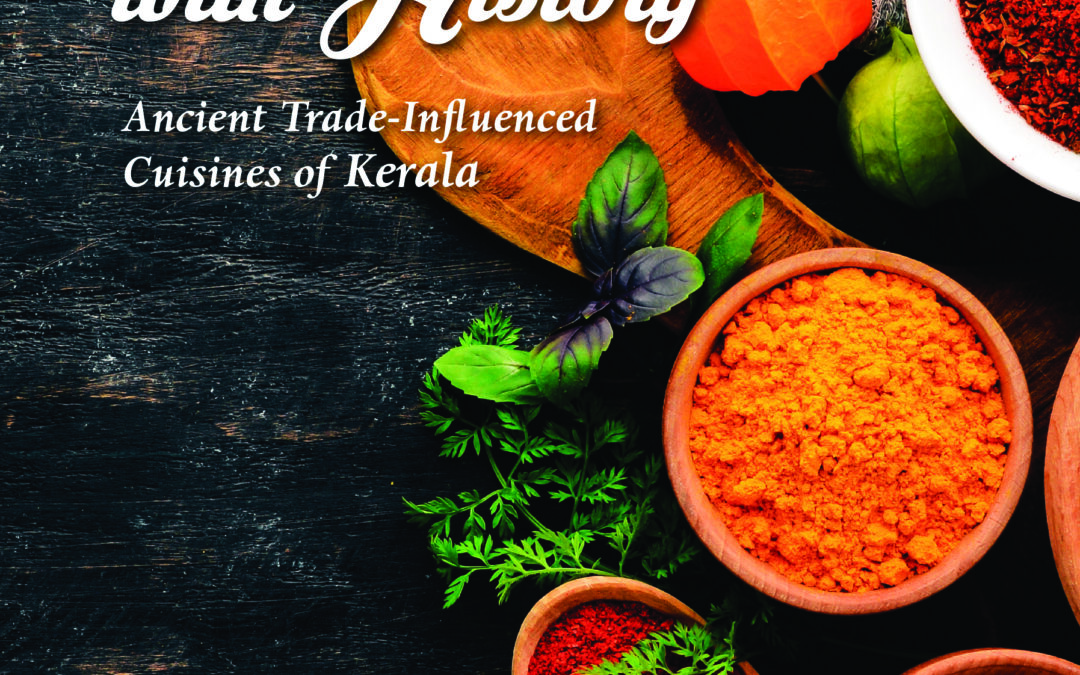A culinary treatise blended with multilayered heritage, & culture of Kerala.
Eating With History: Ancient Trade- Influenced Cuisines of Kerala is a culinary account authored by Tanya Abraham & published by Niyogi books in 2020. The Two hundred four pages book is more than a simple culinary treatise. Its a compendium that perfectly integrates the culinary evolution with multilayered heritage of the communities who made God’s own country their abode down the centuries. The chapter one articulate author’s own reflective journey & her upbringing in a culturally vibrant home where the culinary diversities were largely celebrated.
Fort Cochin’s wondrous amalgamation of cultures brought to our doorstep foods from various backgrounds, recipes of generations that were prepared by the ladies of households.
Page number, 16, Ammama’s Kusinchya, Eating with History, Niyogi Books, 2020
Then the next chapter vividly explored layered history of the communities from the Roman era to the Colonial age & how they influenced the cuisine of Kerala down the centuries. Kerala played the pivotal role in the ancient spice route of sea where the Ancient Arabs traded with the Roman for the exotic spices produced in this land. Down the centuries, it was an outcome of the cross cultural interactions with Jews, Syrians Christians, Arab Muslim traders, Anglo-Indians, & Latin Catholics with local population that gave an unique outlook to the cuisines of Kerala. From Middle Eastern communities such as Arabs, Jews & Syrian Christians to the Portuguese, Dutch, Sephardic Jews (Pardesis/White Jews) & British, the author extensively reviewed the culinary evolution & their impact in shaping the cuisine of Kerala. Its amazing to saw that even in modern day cuisine of Kerala, this reflection can be seen. As for example, it has been cited by author that it was Cochin Jews who brought the “Kubba” from Middle East centuries ago. “Kubba”, a preparation of ground meat, onion & spices while its middle Eastern variant, Kubbeh can be found all across the Arab countries.
With imprints of multiple colonial powers, it was Portuguese who had greater influence on the culinary evolution of Kerala in comparison with others. Not only they brought with them chilies, sweet lime (Mosambi) & other diverse fruits, but also credited to introduce the technique of steaming in food preparations of Kerala, that gave birth to the staple breakfast item, Puttu.
The second section of the book, Way to the Table: The Recipes, covered the details of the recipes that include vegetarian dishes, non-vegetarian dishes, snacks, chutneys, dessert & beverages from different communities. The author carefully collected these recipes from the different households & presented with gustatory clicks & details. These details can serve as a rich guide for the Foodies outside Kerala to experiment these ethnic dishes.
In addition, the photographs from old family albums, archives & street photographs enrich the visual perspectives that will help the readers in understanding the multilayered cross cultural interactions of Kerala’s Culinary evolution. An insightful account that can also serve as a rich source for the researchers & food writers.
About Author: Tanya Abraham is the curator and director of Kashi Art Gallery in Kochi and the founder of the NGO The Art Outreach Society. Tanya was born and raised in Fort Kochi, a town of cultural flavour and antiquity, where her family has been living for the past eight generations. Previously she authored a book was on the history and heritage of her home town Fort Kochi.
Rehan Asad is a medical doctor & currently working as an anatomy faculty. He has a penchant for writing people, food & culture stories.


